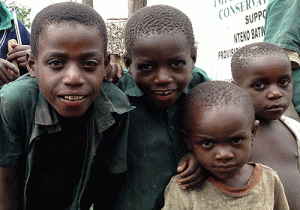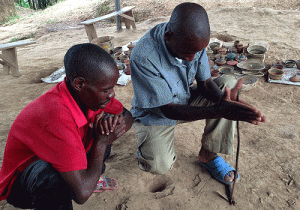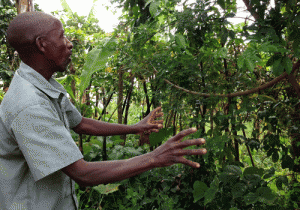
These Batwa boys were playing a game similar to marbles. They were intrigued by our car and were delighted to find out how the hooter functioned.
There are three African tribes that most people have heard of, whether or not they have ever been to or intend to visit Africa: the Zulu, the Masaai and the Batwa. You’re probably shaking your head at the third, the Batwa, but cast your mind back and you’ll certainly have read or heard of Pygmies. Short and slim in stature, rendered memorable by writers from Joseph Conrad and Willard Price to Isabel Allende. This rain forest-dwelling tribe has lived in harmony with nature as hunter gatherers for more than 2.5 million years. They call themselves the Batwa in Uganda and go by other names like Ituri in DRC. Some believe they are the original ‘Africans.’
Origin myths can be powerful things, and if you are Batwa, yours goes something like this: There was a man who had three children. He had to go away and so gave each of them a cup of milk. When he returned, he found that one child has saved their cup of milk, the second had tried to save it but accidentally spilled half of it during the night, and the third, who slept closest to the fire, had drunk all the milk because the heat of the fire made him thirsty.
The man took note of what had happened. Then he spoke to each child. To the first who saved all his milk he said, “You have good patience, you go forth and be a pastoralist.” To the one who had half a cup of milk he said, “You need to learn to be more careful, you go forth and become an agriculturalist.” To the one who had drunk all the milk he said, “You have no patience, you go forth to find your own way to live as a hunter gatherer in the forest.”

I can’t tell you how many unsuccessful attempts I made as a child trying to start a fire this way. I was tutored by these experts and am now in possession of proper fire-starting sticks and advice on what it takes to succeed: “lots of energy and not stopping.” Can’t wait to try it out with Calvin, but if it doesn’t work, it will not be the fault of the tools, but of their wielder: me!
This Batwa myth explains how the cattle herding tribes (like the Karamajong and Maasai) and the farming tribes (like the Kakwa and Kikuyu) came to be. The Batwa are descended from the child banished to the forest. That’s quite a depressing bedtime story. I quizzed my Batwa guide about whether this was their story, or one that had been introduced, but he maintained this was a Batwa myth.
Astoundingly, until the turn of the 20th century, Pygmies, as they were then called by the Europeans, had been classified as animals and were designated fair game for hunting. No surprise that they avoided contact or took defensive actions that earned them a reputation that locals still spontaneously mention today: “These people were wild. They would kill you if they found you in the forest!”
Until the 1980s, these ‘children of the forest’ still maintained much of their traditional lifestyle. Although they lived mostly at the edge of the forest, rather than deep inside it, they spent their time gathering food in the forest, hunting for meat, wearing clothes made from animal hides, and trading smoked meat with the agriculturalist tribes that lived near the forest for anything they might need, like metal arrows.
And then came a conservation milestone:, the designation of Bwindi Impenetrable Forest as a National Park and as a UNESCO World Heritage Site. This was great news for two of the three Great Apes that called the forest home: gorillas and chimpanzees. But it meant the end of human habitation in the forest.
The Batwa were provided with land near (but not next to) the forest and given assistance in learning the ways of a world a million years different: growing food not gathering it, husbanding animals as opposed to shooting for the pot, managing apiaries versus hunting for wild honey 100 feet up a tree in the forest, building permanent housing and wearing modern clothing.
There is no one among the Batwa group in Nkuringo who can speak Batwa or who sing their traditional songs. They sing songs about conservation. Here, the Batwa have intermarried and speak only the local language, the wealthiest man in the village has 15 goats, and their local neighbours speak proudly of them having uplifted themselves and point to the shiny corrugated metal roofs on their houses. The zinc roofs had replaced thatched roofs.
The Batwa living on the northern end of Bwindi have maintain more of their culture than other groups. The elders have taught their language to the younger generations, they continue to agitate to regain access to live in a cave they used to call home, and continue to exhibit some nomadic tendencies to the consternation of the non-Batwa local community.
The Batwa in all locations lead demonstrations of their traditional way of life. For example, I finally got a lesson in fire starting that I hope to try out with Calvin when I get back home. The groups lead educational walks in pocket community forests, and through these opportunities, young Batwa learn about the history and culture of their people.

These medicinal forest plants have been grown to demarcate different family areas. The idea of “my space versus your space” is completely foreign to these people, who simply lived in harmony with nature and without ownership.
“In the forest, life was much easier for us. We would just eat what we found around us,” my guide explained through a translator, showing me a single passion fruit vine transplanted from the edge of the forest that is being encouraged to entangle its way up a tree. “In the forest, if we wanted a fruit, we could just pick it. Now we must grow everything.”
“In the forest, it was simple, we did not need so many things,” he continued. “Life is much harder now, we must work hard to meet our basic needs. Here those needs are more.”
Those basic needs have vastly expanded to include comprehensive healthcare, schooling, permanent shelter and adequate sanitation facilities. The extent of support to the Batwa was evident during my few days here, where we came across the monthly healthcare visit from the district health office, a visit from the tropical agricultural research unit, and a workshop run by an NGO on terracing and garden nurseries. Women have been taught basket weaving and their wares are sold widely to tourists. The rate of cultural change these people have managed is astounding. I doubt many of us would be as successful.
As we walked around the village, the guide pointed out a number of special trees and medicinal plants. “We found these near the forest and brought them back here,” he explained. “These were trees we would see every day in the forest. These are trees that we used in the forest, and so it was important for us to bring these trees here and to have them here, where we are now living.”
I wondered if their hearts still lay in a forest they can see but no longer enter, so I asked.
“We cannot go back to the forest,” he replied simply. “We no longer know the skills to live in there.”
If you’re interested in reading more about the challenge of the lives of these peoples, I recommend this piece, ‘Who Rules the Forest?’ in National Geographic Magazine. It will break your heart. Fortunately there are a number of organizations who work for the rights of indigenous peoples, which include the Batwa.
No responses yet